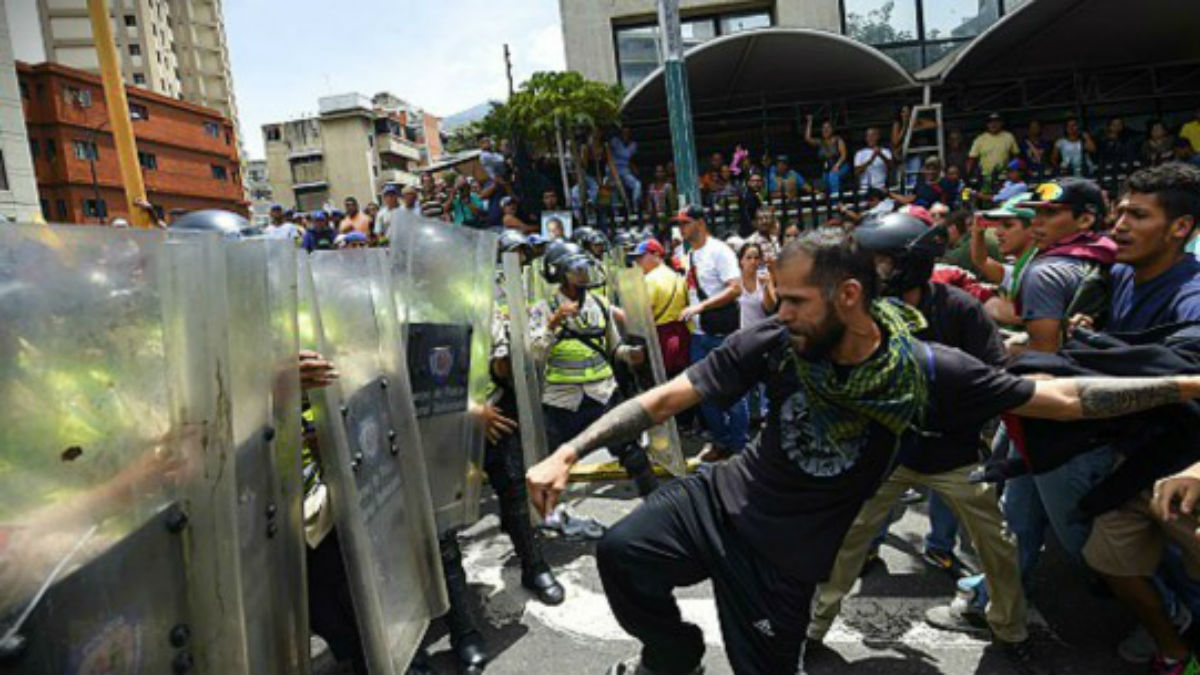Venezuela on the brink of collapse
Political and financial crisis deepens with pressure on president Nicolas Maduro to stand down

A free daily email with the biggest news stories of the day – and the best features from TheWeek.com
You are now subscribed
Your newsletter sign-up was successful
The political and economic crisis in Venezuela is continuing to deepen, with protesters taking to the streets of Caracas to demand that socialist president Nicolas Maduro resign.
"A large, seemingly wealthy, apparently modern and resource-rich country is on the brink of collapse, financial default and, potentially, a humanitarian crisis," says the Financial Times.
There has been little intervention from foreign powers, which should have "every interest" in encouraging a stable outcome in a country with the world's largest oil reserves, the newspaper reports.
The Week
Escape your echo chamber. Get the facts behind the news, plus analysis from multiple perspectives.

Sign up for The Week's Free Newsletters
From our morning news briefing to a weekly Good News Newsletter, get the best of The Week delivered directly to your inbox.
From our morning news briefing to a weekly Good News Newsletter, get the best of The Week delivered directly to your inbox.
Desperation
Venezuela's crumbling economy has been hit hard by plummeting oil prices, with the country suffering triple-digit inflation, as well as chronic medicine and food shortages that have sparked riots.
People are being forced to queue for hours outside supermarkets, even in wealthier parts of the capital, and there are widespread reports of looting. "I have not been able to get milk, sugar or cornflour in about four or five months," said one woman.
Some are turning to black market traders, known as bachaqueros, who "sell basic products at eye-watering prices", says The Guardian.
A free daily email with the biggest news stories of the day – and the best features from TheWeek.com
Power outages have exacerbated the oil-dependent nation's already significant economic woes and forced Madura to impose a two-day working week for all government employees. The government has so far managed to avoid complete economic collapse by borrowing billions of dollars from China.
Last week, Madura declared a 60-day state of emergency in order to protect the country from what he described as a "coup". The latest opinion polls reveal 70 per cent of people want him out by the end of the year, but he continues to cling to power.
"You can hear the ice cracking," said one US intelligence official.
The blame game
Maduro has long laid the blame for the meltdown on an "economic war" being waged by the opposition and its international allies in order to end his rule.
The opposition, which stormed to victory in legislative elections last December, says Maduro and his predecessor Hugo Chavez, are responsible.
"The threats Venezuelans face today are not the result of foreign or domestic conspiracies, but Mr Maduro's disastrous leadership," says the New York Times.
Even some of the president's own supporters have turned their back on him. "We voted for Maduro because of a promise we made [to] Chavez, but that promise has expired," mechanic Wilson Fajardoa told Reuters. "Either they solve this problem, or we're going to have to take to the streets."
The future
There is enormous public support for a national recall referendum, which could remove Maduro from power and trigger fresh elections.
But vice president Aristobulo Isturiz made the government's stance clear this week. "Maduro will not be ousted by a referendum because there will be no referendum," he said.
"The military, packed with Chavez loyalists, is seen as key to Maduro's survival," says Reuters. It adds that opposition groups are also struggling to mobilise enough of the electorate. "Fears of more violence after 2014 protests that left 43 people dead may yet keep a lid on unrest," it says.
-
 The ‘ravenous’ demand for Cornish minerals
The ‘ravenous’ demand for Cornish mineralsUnder the Radar Growing need for critical minerals to power tech has intensified ‘appetite’ for lithium, which could be a ‘huge boon’ for local economy
-
 Why are election experts taking Trump’s midterm threats seriously?
Why are election experts taking Trump’s midterm threats seriously?IN THE SPOTLIGHT As the president muses about polling place deployments and a centralized electoral system aimed at one-party control, lawmakers are taking this administration at its word
-
 ‘Restaurateurs have become millionaires’
‘Restaurateurs have become millionaires’Instant Opinion Opinion, comment and editorials of the day
-
 Epstein files topple law CEO, roil UK government
Epstein files topple law CEO, roil UK governmentSpeed Read Peter Mandelson, Britain’s former ambassador to the US, is caught up in the scandal
-
 Iran and US prepare to meet after skirmishes
Iran and US prepare to meet after skirmishesSpeed Read The incident comes amid heightened tensions in the Middle East
-
 Israel retrieves final hostage’s body from Gaza
Israel retrieves final hostage’s body from GazaSpeed Read The 24-year-old police officer was killed during the initial Hamas attack
-
 China’s Xi targets top general in growing purge
China’s Xi targets top general in growing purgeSpeed Read Zhang Youxia is being investigated over ‘grave violations’ of the law
-
 Panama and Canada are negotiating over a crucial copper mine
Panama and Canada are negotiating over a crucial copper mineIn the Spotlight Panama is set to make a final decision on the mine this summer
-
 How oil tankers have been weaponised
How oil tankers have been weaponisedThe Explainer The seizure of a Russian tanker in the Atlantic last week has drawn attention to the country’s clandestine shipping network
-
 Why Greenland’s natural resources are nearly impossible to mine
Why Greenland’s natural resources are nearly impossible to mineThe Explainer The country’s natural landscape makes the task extremely difficult
-
 Iran cuts internet as protests escalate
Iran cuts internet as protests escalateSpeed Reada Government buildings across the country have been set on fire